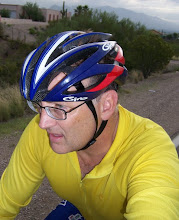
Bobby, "M'am" and Frank, 1919
My Grandfather lied about his age to join the Navy in either 1916 or 1917--he was born in 1900. That's him on the left of the photo, standing next to my Great-grandmother, Rose--and oldest son Frank. The story of this photograph is that the Chandler Brothers--Frank and Richard, enlisted in the Army, but my Grandfather, Robert, was turned down because he was too young.
I recall the story my Grandpa told that he paid a stranger five dollars to tell a Navy recruiter, "Oh yeah, Bobby Chandler--I know him well--he's eighteen, sure..." and so that was that. Of course, my Great-grandmother was devastated--but it was too late, Bobby shipped out quickly.
My Grandfather was on leave, and had not been back to the farm for over a year or more. On the way home, in the train station in Kansas City, Missouri--he literally ran into his older brother.
Grandpa said that at the train depot there in Kansas City, there were probably about 100,000 soldiers and sailors going this way and that--it was madness. He accidentally backed-up into this tough-looking Dough Boy--it was Frank. They couldn't believe it! They were on leave at the same time. The photograph above commemorates that miraculous meeting in the depot that day.

Bruce Chandler, 1862 - 1946
My Great-grandfather and I were born 100 years apart. He was born in Kansas Territory right at the start of the Civil War. Years later Great Bruce and the family had a large apple orchard near the small town of Anderson, Missouri.
During World War II, several hundred German POWs worked in his huge orchard picking apples and working other crops. My father as a small boy recalled vividly riding on the backs of Babe and Pal, Great Grandpa Bruce's two gigantic draft horses, and picking apples with the young German prisoners. He said most of the POWs were just simple farm boys themselves.
Whenever my Dad visited the farm from Tulsa during the war (they saved gas ration cards so they could make the drive) he said my Great Grandmother Rose, "M'am" as they called her, always cooked big meals for all the men, the German POWs and the American soldiers that guarded them as well, and everyone sat together in the house and on the front porch eating lunch or dinner. He said Grandma Rose was kind-hearted and much loved by everyone, and that after the war many of the former German POWs sent her cards and letters on her birthday and at Christmas time.
Sadly, my Grandfather's brother, Frank, did not come back from the trenches of the First War unscathed--months of combat, wounded several times, he was, I believe, a changed person--very difficult to get along with and moody. My grandparents never spoke of him, nor did my father much either--only after my grandparents had passed away did I only pry bits of information about him from my father.
I knew he was the local sheriff in Anderson for awhile--a tough looking hard man the type that you didn't mess with. I suspect he committed suicide sometime in late 1940s--these matters were never discussed and my inquiries about him from old photographs were often met with a deafening silence--and the subject gently changed.
Little Egypt gets magazines and information from the Nat'l Guard and other military information intended as resources for soldiers coming home from Iraq and Afghanistan. A lot of these articles feature young people making heroic efforts to get back to some kind of normalcy after losing their legs from roadside bombs and other injuries. But the matter of PTSD is the hard one to put one's finger on--the struggle from deeper wounds, like the ones my Great Uncle Frank's generation suffered on their return from war.
Rest in Peace, Uncle Frank.

No comments:
Post a Comment